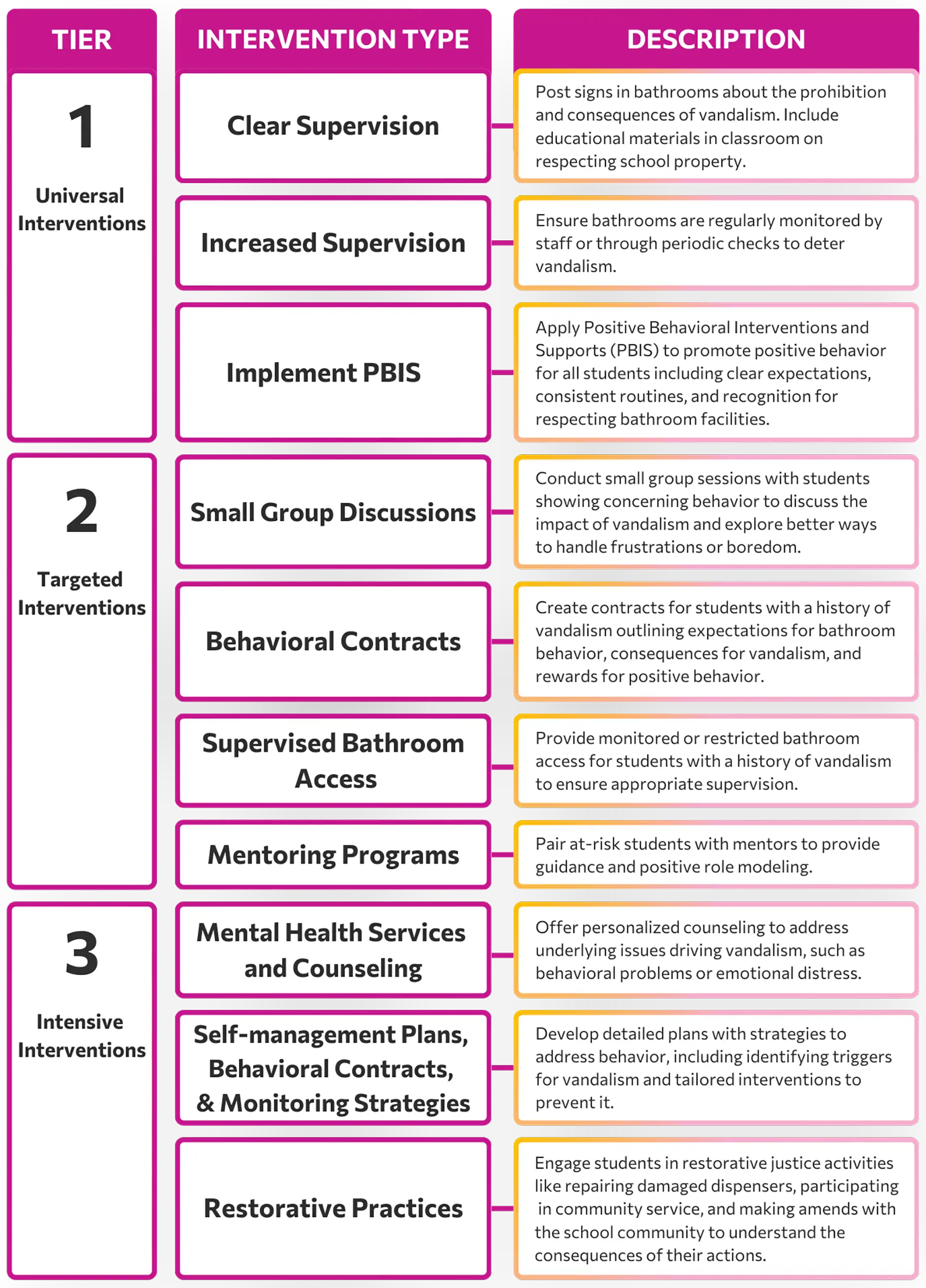Schools
Support & Resource Guide for Implementing HB24-1164: Free Menstrual Products in Schools
Legislation Passed, Must Be Policy Enacted!
Legislation passed must be policy enacted. More than a year and a half ago, on June 5, 2024, Governor Jared Polis signed HB24-1164 into law, guaranteeing free menstrual products for students across Colorado. Now the focus is on ensuring this promise is fully implemented in every school.
The first milestone has passed.
Colorado law required every school to stock period products in at least 25% of female and gender-neutral restrooms, with the remaining 75% of those restrooms displaying clear signage directing students to available supplies. With support from Justice Necessary, 460 schools across Colorado took meaningful steps toward compliance and student access.
The second milestone is approaching.
By June 30, 2026, schools must increase access by stocking period products in 50% of female and gender-neutral restrooms, while the other 50% must feature clear signage guiding students to available supplies.
This work goes beyond checking a compliance box—it’s about ensuring students can attend class, stay engaged in learning, and take part in school and extracurricular activities without disruption.
The legislation has passed, and implementation is underway.
Justice Necessary remains committed to walking alongside our schools—equipping them with the tools and products needed to meet each milestone of the law and support students’ ability to learn, participate, and thrive every day.
Ready to make this change happen in your school? Use the resources on this page to take the next step. Let’s get started!
The School Team
To support this initiative, Justice Necessary has assembled a team of experts ready to assist schools in meeting these requirements. The team includes Dr. Sharon Michael, an Educational Consultant and former teacher, coach, and elementary school principal with deep expertise in K–12 leadership, policy compliance, and educator support; Emily Kontz, LCSW, a Clinical Social Worker Consultant with more than 11 years of experience in mental health and school social work, bringing practical expertise in student support, family advocacy, and school-based implementation; and Karen Wick, Policy Implementation Coordinator and principal at Swift Strategies, who brings more than 15 years of legislative and government relations experience—including leading statewide education policy efforts—to help schools translate legislative requirements into clear, actionable steps.

Dr. Sharon Michael
Educational Consultant

Peter Rivera
School and Community Engagement Lead

Emily Kontz, LCSW
Clinical Social Worker Consultant

Karen Wick
Policy Implementation Coordinator

Diane Cushman Neal
Founder & President
Diane Cushman Neal
Founder & President


Dr. Sharon Michael
Educational Consultant

Karen Wick
Policy Implementation Coordinator

Emily Kontz, LCSW
Clinical Social Worker Consultant
This comprehensive resource equips schools and families with step-by-step guides, best practices, and practical tools to support student attendance, participation, and success throughout the school day.
Justice Necessary is here to walk alongside schools—providing guidance, products, and hands-on support as they implement HB24-1164 and ensure students have what they need to stay in class, engaged in learning, and fully participating in school life.
Menstrual Product Grant
Justice Necessary is proud to offer a Menstrual Product Grant to support Colorado schools in providing essential menstrual products. This one-time grant supplies recipients with pads, tampons, and dispensers for use during the summer of 2026 and the 2026–2027 school year.
Designed to supplement Colorado’s HB24-1164, “Free Menstrual Products to Students,” initiative, the grant helps schools meet legislative requirements while ensuring students can remain in class and focused on learning without interruption.
All Colorado school districts, individual schools, and charter schools are encouraged to apply, with special consideration given to rural schools and schools with a high percentage of students eligible for Free & Reduced Lunch.
Key Dates
- Application Opens: February 16, 2026
- Application Closes: March 2, 2026 at midnight
- Informational Webinar Option 1: March 24, 2026
- Informational Webinar Option 2: April 1, 2026
- Notification of Award: March 18, 2026
Legislative Summary
Free Menstrual Products for Students in Grade 6-12
Colorado law requires menstrual products to be available free of charge to students in grades 6-12 in applicable student bathrooms. This law applies to all Colorado public schools, including district schools, district charter schools, institute charter schools, boards of cooperative services, Colorado School for the Deaf and Blind and facility schools.
An “applicable student bathroom” means a female-designated or gender-neutral bathroom that is used by students in grades 6-12. If a school does not have gender-neutral bathrooms, products must be available in a health or nurse’s office or the main office in addition to a female-designated bathroom. There is an exception for K-6 schools. For these schools, the law allows for the products to be available in a health or nurse’s office or the main office instead of in the bathrooms. For K-8 schools, products only need to be provided in the applicable bathrooms that primarily serve the students in grades 6-8. Schools may remove products from a bathroom if vandalism or destruction of school property occurs in that bathroom due to providing these products. When products are not available in a bathroom for any reason, there needs to be signage as to where students can find the products in the school.
The bill took effect in the 2024–2025 school year and includes a phased implementation timeline to give schools time to meet compliance requirements. The first milestone was June 30, 2025, marking the beginning of required product availability in student restrooms.
Implementation Timeline
- By June 30, 2025, menstrual products are required in at least 25% of applicable student bathrooms.
- By June 30, 2026, menstrual products are required in at least 50% of applicable student bathrooms.
- By June 30, 2027, menstrual products are required in at least 75% of applicable student bathrooms.
- By June 30, 2028, menstrual products are required in 100% of applicable student bathrooms.
Exemptions
Small rural schools—including charter schools, the Colorado School for the Deaf and the Blind, and approved facility schools—are exempt from the phased timeline above but are required to comply with the law no later than June 30, 2028.
Grant funding is available through the Colorado Menstrual Hygiene Products Accessibility Grant Program administered by the Colorado Department of Education (CDE). Eligible schools and districts may apply for funding to purchase menstrual products, dispensing machines, and disposal receptacles. Additional information is available through CDE.
Free Menstrual Products for Students in Grade 6-12
Colorado law requires schools to provide free menstrual products, including pads and tampons, to students in grades 6–12. This requirement applies to all Colorado public schools, including charter schools, facility schools, and the Colorado School for the Deaf and the Blind.
Menstrual products are required to be available in female and gender-neutral restrooms used by students in grades 6–12. If a school does not have a gender-neutral restroom, products may be made available in the health or nurse’s office or the main office. If a school does not have gender-neutral bathrooms, products can be kept in the health/nurse’s office or the main office. One exception is for a K-6 school – in this case, the products do not need to be in the bathrooms but do need to be available in the health/nurse’s office or main office.
If a school does not have a gender-neutral restroom, products may be made available in the health or nurse’s office or the main office. For K–6 schools, products are not required to be placed in bathrooms but must be available in the health or nurse’s office or the main office.
If vandalism or damage occurs in a restroom as a result of providing menstrual products, a school may temporarily remove the products from that restroom. In those cases, the school is required to post clear signage indicating where students can access products elsewhere in the building.
The law includes a phased implementation timeline to allow schools time to meet full compliance. The first milestone was reached on June 30, 2025, when schools were required to provide products in at least 25% of applicable student bathrooms. This requirement increases by 25% each year until June 30, 2028, when products must be available in 100% of applicable student bathrooms.
Schools in small rural school districts—defined as districts with fewer than 1,200 students districtwide—including charter schools located in those areas, facility schools, and the Colorado School for the Deaf and the Blind, are exempt from the phased timeline but are required to comply with the law no later than June 30, 2028.
Period Product Vandalism
Period product vandalism is a critical issue that is often used to not comply with providing period products in schools. This bill specifies that if any vandalism or damage is caused in a bathroom because of these products, the school can take the products out of the bathroom, but the school needs to post information about other locations where products can be found in schools.
If vandalism or destruction of property occurs as a result of complying with the law, a local education provider, the Colorado School for the Deaf and the Blind, or an approved facility school may remove menstrual products from the specific applicable student bathroom experiencing the vandalism.
The legislation is explicit that this provision applies at the bathroom level, not across an entire school or school district. Vandalism or damage in one restroom does not authorize the removal of menstrual products from other student bathrooms, nor does it permit removal from all bathrooms in a school or district.
When menstrual products are removed from an applicable student bathroom due to vandalism, the law requires the school to post clear information in that bathroom directing students to where menstrual products remain available elsewhere in the school building. This ensures continued access while addressing the specific location where damage has occurred.
In short: one restroom with damage does not equal removal across the entire school or school district. The law allows a targeted response to vandalism while maintaining student access to menstrual products.
What is vandalism?
Ideological Vandalism
Ideological Vandalism is a type of property damage motivated by political, religious, or social beliefs. It’s a deliberate act aimed at making a statement or expressing a viewpoint through the destruction or defacement of property.
It Looks Like...
- Deface or destroy the period product dispensers
- Tamper with the products inside the dispensers rendering them unusable.
- Spread misinformation or harmful stereotypes about menstruation through messages attached to or near the dispensers.
- Physically obstruct access to the dispensers.
Restorative Response
- School-Wide Prevention and Universal Interventions
- Multi-Tiered System of Support (MTSS)
- Restorative Justice Approaches
- Build Positive School Climate and School Bonding (PBIS)
- Individual Student-Focused Alternatives
- Mental-Health Services and Counseling
- Self-Management Plans, Behavioral Contracts, and Behavioral Monitoring Strategies
- Alternative Programs and Schools
Vindictive Vandalism
Vindictive Vandalism is a destructive behavior motivated by a desire to cause harm or revenge. It often targets specific individuals or groups and is driven by personal animosity rather than broader ideological beliefs.
It Looks Like...
- Targeting the Dispenser: Deliberately damaging the dispenser making it unusable.
- Product Tampering: Intentionally ruining the period product, making it unsanitary or ineffective.
- Mess Creation: Scattering products around the restroom in a way that is disrespectful and disruptive.
- Threatening or Harassing Messages: Leaving messages near the dispenser aimed to intimate or provoke those who use the products or those who provided them.
Restorative Response
- School-Wide Prevention and Universal Interventions
- Multi-Tiered System of Support (MTSS)
- Restorative Justice Approaches
- Build Positive School Climate and School Bonding (PBIS)
- Individual Student-Focused Alternatives
- Mental-Health Services and Counseling
- Self-Management Plans, Behavioral Contracts, and Behavioral Monitoring Strategies
- Alternative Programs and Schools
Play Vandalism
Play Vandalism generally refers to acts of destruction or misuse that are seemingly without a clear motive other than a desire to cause disruptions or mischief. It often involves a sense of playfulness or curiosity, but the actions result in damage or inconvenience.
It Looks Like...
- Product Misuse: Using the period products for purposes other than their intended use, such as stuff them into toilet bowls or sinks.
- Dispensing Issues: Intentionally jamming the product dispenser or causing it to malfunction.
- Product Scattering: Throwing products around the restroom in a playful or careless manner.
Restorative Response
- School-Wide Prevention and Universal Interventions
- Utilitize MTSS for universal, prevention-based supports and interventions (Tier 1)
- Utilize MTSS for targeted supports School-Wide and individualized interventions (Tier 2-3)
- School-Wide PBIS
- Individual Student-Focused Alternatives
- In-School Alternatives
- Adult Mentors and Positive Teacher-Student Relationships
References and Additional Resources
Colorado School Safety Resource Center. (2021). Restorative practices guide: A resource for schools. Colorado Department of Public Safety. https://cdpsdocs.state.co.us/safeschools/Resources/CSSRC_Resource_Guides/CSSRCRestorativePracticesGuide2021.pdf
Colorado Department of Education. (n.d.). Multi-Tiered System of Supports (MTSS). Retrieved December 11, 2024, https://www.cde.state.co.us/mtss
U.S. Department of Education. (2023). Guiding principles: A resource guide for improving school climate and discipline. https://www.ed.gov/sites/ed/files/policy/gen/guid/school-discipline/guiding-principles.pdf
The Impact of Period Product Vandalism
From Minor Inconvenience to Major Crisis: The Spectrum of Period Product Vandalism
Tier 5: Catastrophic
- School-wide crisis: Extensive damage to multiple restrooms, including other facilities
- Public health threat: Increased risk of infections due to unsanitary conditions
- Loss of trust: Erosion of community and school trust, impacting overall school climate
Tier 4: Critical
- Targeted attacks: Deliberate and coordinated acts of vandalism
- Comlete disruptions: All dispensers inoperable, products inaccessible
- Emergency situation: Students facing immediate health risks due to lack of products
Tier 3: Severe
- Widespread vandalism: Multiple dispensers damage or destroyed
- Product shortages: Significant depletion of product supplies
- Negative impact on students: Increased menstrual stigma, health risks and academic disruptions
Tier 2: Moderate
- Recurring incidents: Frequent tampering or theft of products
- Moderate damage: Dispensers damaged, requiring repairs or replacement
- Disruption of access: Students experiencing difficulty accessing necessary products
Tier 1: Minimal
- Isolated incidents: Occasional tampering or misuse of products
- Minor damage: Dispensers slightly damaged, but still functional
- Minimal impact: Limited disruption to menstrual hygiene access
Supportive & Restorative Practices
Restorative justice is a way of responding to wrongdoing that focuses on healing the harm caused, rather than simply punishing the offender – bringing together everyone affected by harm to address the damage done and find solutions that repair relationships and strengthen the community. This approach values open communication, mutual support, and cooperation over isolation and punishment. Before implementing any restorative justice, it’s crucial to fully understand the harm caused by the ideological vandalism. This includes:
- Impact on individuals: How has the vandalism affected those who rely on the period products?
- Impact on the community: What message does the vandalism send about the community’s values?
- Impact on the environment: Consider the environmental implications of the vandalism, such as waste and pollution.
Evidence-based Restorative Interventions
Access to period products is crucial for students’ health and equal access to participation in school, so what can be done if these products and their supply stations (e.g dispensers, baskets, etc.) face vandalism? Research shows that effective practices for promoting positive school environments include Supportive and Restorative strategies, which guide students toward positive behavior through encouragement, clear expectations, and proactive measures, rather than relying solely on punishment or zero-tolerance. These strategies aim to support students in understanding and meeting behavioral expectations while addressing underlying issues that may contribute to misbehavior. Restorative approaches can be implemented at both the universal and individual-student level. Here are some evidence-based restorative interventions to address vandalism while ensuring students continue to have access to hygiene products.
Multi-Tiered System of Supports
MTSS, or Multi-Tiered System of Supports, is a comprehensive framework designed to help all students succeed through a continuum of support. It operates on three levels of intervention:
 Tier 1
Tier 1
- Provides universal support to all students, incorporating basic instruction and general help integrated into regular classroom teaching. For issues like vandalism in school bathrooms, Tier 1 interventions include strategies such as posting clear signage to discourage vandalism and educating students about the importance of respecting school property.
- Increased supervision and the implementation of Positive Behavioral Interventions and Supports (PBIS) also fall under this tier, aiming to promote positive behavior and establish clear expectations.
 Tier 2
Tier 2
- Focuses on more targeted support for students who need additional help. This may involve small group discussions addressing vandalism and its impact, creating behavioral contracts with students who have shown concerning behavior, and offering supervised bathroom access to those at higher risk.
- Mentoring programs can also be implemented to guide at-risk students and provide positive role models.
 Tier 3
Tier 3
- Involves intensive, individualized support for students engaged in repeated or severe vandalism.
- This tier includes personalized counseling to address underlying issues, developing self-management plans and specific behavioral contracts, and utilizing restorative practices such as repairing damage and participating in community service.
Using these interventions at each tier helps to address vandalism to supply stations and products comprehensively, providing both preventive measures and targeted support for students. Schools that do not use an MTSS framework can select interventions identified throughout the tiers as a tailored, individualized school and student approach to address vandalism. The goal of MTSS is to make sure every student gets the help they need to succeed in school. Examples of addressing vandalism targeting supply stations and their products in bathrooms can be approached through the MTSS framework as follows:
References and Additional Resources
Colorado School Safety Resource Center. (2021). Restorative practices guide: A resource for schools. Colorado Department of Public Safety. https://cdpsdocs.state.co.us/safeschools/Resources/CSSRC_Resource_Guides/CSSRCRestorativePracticesGuide2021.pdf
Colorado Department of Education. (n.d.). Multi-Tiered System of Supports (MTSS). Retrieved December 11, 2024, https://www.cde.state.co.us/mtss
U.S. Department of Education. (2023). Guiding principles: A resource guide for improving school climate and discipline. https://www.ed.gov/sites/ed/files/policy/gen/guid/school-discipline/guiding-principles.pdf
Explore Further
FAQ & Resources
Got Questions? Need Resources?
Find everything you need to implement successful programs in your school!
School Communication
Communication is Key!
Discover how open dialogue and clear messaging can make period product implementation a success in your school.
Shape the Future
Change A Life, Shape The Future™
At Justice Necessary, we believe that when a community comes together, we have the power to change lives – allowing Colorado students to shape their own future.
Whether you’re a student passionate about creating change, a club member ready to lead, or a teacher committed to empowering your students, the Shape the Future program is here to guide and support you every step of the way.
Stay Informed
Our toolkit includes practical resources, step-by-step guides, and best practices for ensuring that all students have access to free menstrual products, promoting equity and well-being in our educational spaces. In addition to our focus on schools, we also offer valuable resources for families, helping them understand this important initiative and how it supports students’ success in the classroom. Sign up today to stay informed about the latest resources, updates, and additions to our toolkit.

